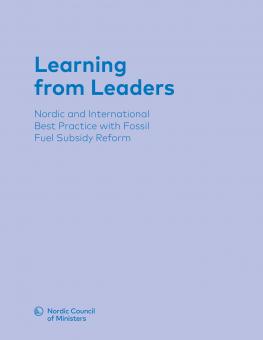
Learning from Leaders: Nordic and International Best Practice with Fossil Fuel Subsidy Reform
This report describes how Ethiopia, Morocco, Peru and the Philippines have reformed their subsidies. It also describes how countries including Denmark, Finland, Norway and Sweden have introduced innovative policy instruments to encourage switching towards renewable and sustainable energy.
If we aim to reduce global emissions in order to limit global warming to less than 2°C above pre-industrial levels, then the energy sector is of paramount importance.
A critical change will be national fuel switching away from carbon-intensive sources and increased effort towards energy efficiency and sustainable energy. Subsidies and support from governments to fossil fuels encourage the opposite.
Many countries and regions are making this switch: from subsidising fossil fuels and towards investing in sustainable energy.This report describes how Ethiopia, Morocco, Peru and the Philippines have reformed their subsidies. It also describes how countries including Denmark, Finland, Norway and Sweden have introduced innovative policy instruments to encourage switching towards renewable and sustainable energy.
You might also be interested in
The Cost of Fossil Fuel Reliance
Government support for fossil fuels reached at least USD 1.5 trillion in 2023, new data shows.
Increased Support Needed to Achieve India's Clean Energy Goals
India is on track to achieve many of its 2030 clean energy goals but needs to step up government support measures to accelerate the deployment of offshore wind, electric vehicles, and green hydrogen, according to a new report.
Ending Export Credits for Oil and Gas: How OECD countries can end 2024 with a climate win
For a year now, Organisation of Petroleum Exporting Countries (OECD) governments have been negotiating an agreement that could put an end to oil and gas export finance. Following the acrimony in Baku, this would be a very real way for the OECD to show policy coherence, respond to calls from the poorest countries to stop subsidizing fossil fuels, and shift public finance to solutions.
Fossil Fuel Production, Renewable Energy, and Subsidy Reform in Nationally Determined Contributions 3.0
This policy brief provides an analysis of the critical benchmarks and recommendations necessary for aligning nationally determined contributions (NDCs) with the 1.5 °C target.